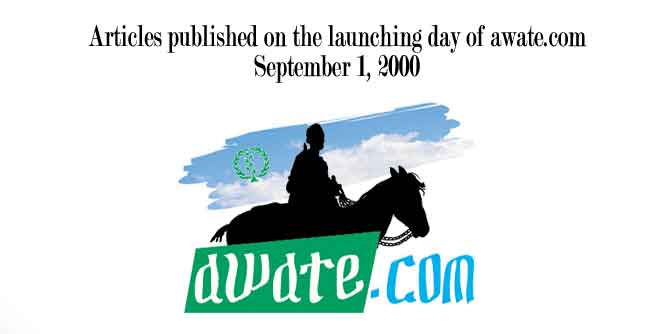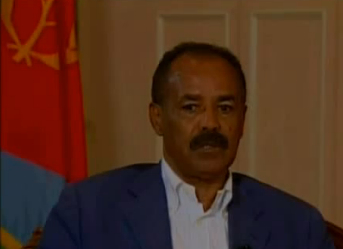From the Teachings of Woldeab Woldemariam

Translated from Tigrinya By Awate Research Unit – September 1, 2000
Woldeab Woldemariam was a lifetime teacher and a great debater. His Commitments to individual freedom, democracy, and justice were as unshakable as his commitments to the unity of Eritrea and the dignity of its people. Read The following extracts and quotations from his writings of the 1940s from his newspaper articles, now compiled in a Tigrigna book entitled “Mirutsat Anqetsat Ato Woldeab, 1941-1991”, edited by Tikabo Aresi’e and printed by Hedri Publishers in Asmara in 1995.
On Democracy and Dictatorship
( PP. 109-110, an article from Semunawi Gazeta No 3 of 14 September 1942)
1. “Many Eritreans could have read my previous writings on democracy and dictatorship. These are two different systems of governance. At the present, the two are locked in an armed collision [WW II] and many things are being said about them. It is therefore of interest to present to you [readers of Semunawi Gazeta] a brief description of these two opposed systems.
In a democratic system, all the people participate in the affairs of the State. That is why we hear about elections and changes of government in Great Britain and America. A nation under a democratic system elects its leadership. The people have full freedom to criticize or commend their leadership in the papers and over the radio. In a democracy, all issues of concern to the people are discussed in public and with full transparency. The legislative doors are kept open for the citizen who also has the right to know how the laws on taxation are made and how the public expenses are organized.
But at times, some nations fall under the rule of single persons who come to power through [means other than democratic elections]. They are called dictators and their rule is called dictatorship.
In a dictatorship, the leader is considered infallible, almost sacred, and therefore not liable for criticism. His whims and goodwill replace the functions of the government.
Therefore, the people find it difficult to replace dictatorship except through a resort to [non-democratic means]. This process starts with public grumbles and protests, which in their turn invite suppressive reaction from the system. To intimidate and terrorize the population to submission, the system recruits many security agents. It makes efforts to show that the laws of the dictator are correct and wise and his rule just. The people are even expected to say that they are happy in their situation.
In this way, the nation gradually slides into a troubled slumber, but only to wake up [anytime] and find themselves in the midst of a Great War [civil war]. When fully awakened, the people realize that the dictator was not what they thought he was – a superman endowed with supernatural powers. They then start to see in him a selfish mortal who built ladders with human remains to defend his citadel of power. However, this realization often comes a bit too late, after the damage had been wrought.”
On Accountable Government
2. “There are some persons who say there will not be a need for a deed of covenant between one’s own government [after a possible conditional union with Ethiopia] and the Eritrean people. Those who tell us that our government should not be accountable to our wishes do not appear to have thought very well for the welfare of the Eritrean people. As far as I see it, they are only parroting assumptions based on what they had been told. For sure, it is only the weak and poor who put their trust only on agreements and accountability. The well placed, the powerful, have no need for covenants and accountability..”
(PP 83-84 , from Semunawi Gazeta No.246 of 22 May 1947, in an article entitled ‘Eritra Nmen?’.
3. “A people is entitled to demand its basic rights not only from an alien government but also from a government of its own blood brothers.”
P. 85, from the same article.
4. “Dear reader, dear proud compatriot! Be brave (seb’ay kun). It is up to you to strive for your full freedom… Do not wait to be bottle-fed like a small baby. Will you mind if, out of sincerity and all the good wishes for you, I advise and urge you to be the Bridegroom and the Host of this coming Great Event [end of colonial rule]? It is out of a fervent wish to see you free and prosperous
that I address you in this manner, and I hope you understand me. Do not allow your freedom to stop halfway. You had been under bitter bondage, and that is why you demanded to enjoy the sweetness of freedom.”
P 86, from the same article.
5. “The first stage of freedom/liberation (Harnet) is getting oneself rid of colonial [European] domination. The second stage is internal liberation, which has to mean the full enjoyment of equality and liberty in brotherhood under your own government and among your own people. The first stage of our liberation will be fulfilled [through conditional union with Ethiopia], and the second stage of our liberation should be obtained by asking or arguing for our domestic rights with [the Emperor of Ethiopia]”.
P. 87, same article.
6. “If we consult past world history, we learn that the fight for internal freedom demanded at least as much combat as was required for the liberation from alien rule. For instance, the great war [civil war] in France, the great war in Russia and the great war in North America were not fought against external enemies but [against one’s own State authorities] for the sake of internal freedom.”
PP. 87-88, second in series of the same article, Eritrea Nmen, appearing in Semunawi Gazeta of 29 May 1947.
7. The Eritrean people and also the people of Tigrai will have to be allowed to send their elected representatives to a national parliament. However, there are persons who tell us the time is not ripe to raise such issues now. It is not fair to condemn as traitors and ‘Woyane’ [Tigrai rebellion of 1943] to those who, for instance, demand the rights of the Tigrigna speaking people… In reality, a traitor and ‘Woyane’ is every sycophant and hypocrite (leQlaQn gbuzn) amongst us who do fail today to react in defense of the rights of the people being trampled in front of his own eyes. But overwhelmed with sorrow, I ask as to when will the right time be for us to speak out openly about our cause and our people. .”
P.93, Semunawi Gazeta of 29 May 1947.



Awate Forum